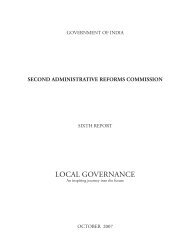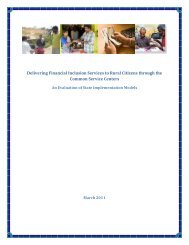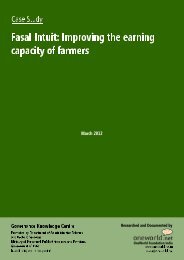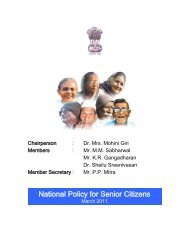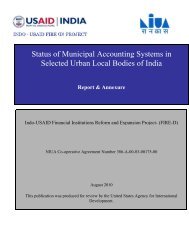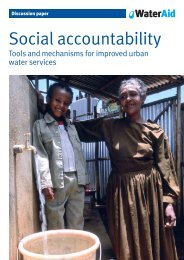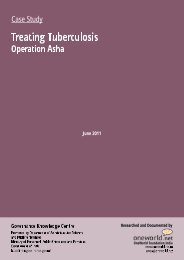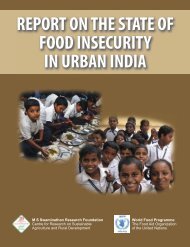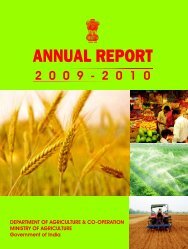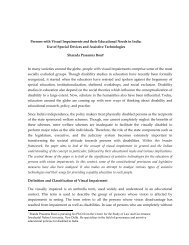Approaching equity - Indiagovernance.gov.in
Approaching equity - Indiagovernance.gov.in
Approaching equity - Indiagovernance.gov.in
- No tags were found...
You also want an ePaper? Increase the reach of your titles
YUMPU automatically turns print PDFs into web optimized ePapers that Google loves.
PreambleNon-<strong>gov</strong>ernmental organizations and civil societyorganizations from across the country, represent<strong>in</strong>g variousconstituencies and theoretical approaches, collectivelywelcome the effort of the Plann<strong>in</strong>g Commission of Indiato make the plann<strong>in</strong>g process more responsive to citizens’concerns for the 12 th Five Year Plan Approach Paper.We have seized this opportunity to make this 12 th FiveYear Plan process further participatory, and somewhatrepresentative of public op<strong>in</strong>ion. Government plann<strong>in</strong>gis one of the few sites that lend itself to participation bycivil society and non-<strong>gov</strong>ernment experts. In address<strong>in</strong>gthe emerg<strong>in</strong>g Plan Approach, we have undertaken widerang<strong>in</strong>gconsultations to identify and reflect the <strong>in</strong>sights andaspirations of the public <strong>in</strong> whose best <strong>in</strong>terests the Stateshould seek to <strong>gov</strong>ern.These pr<strong>in</strong>ciples have already been enshr<strong>in</strong>ed <strong>in</strong> thePreamble to the Indian Constitution – Justice – social,economic, and political – and should be kept <strong>in</strong> m<strong>in</strong>d ifthe State is to deliver the people’s rights and entitlements.The Directive Pr<strong>in</strong>ciples are declared as “fundamental to the<strong>gov</strong>ernance of the country”. Article 37 imposes an obligationon the State to apply them. S<strong>in</strong>ce the Constitution emphasisesthe positive duty of the State to promote the welfare of thepeople by affirm<strong>in</strong>g social, economic and political justice,as well as to fight <strong>in</strong>come <strong>in</strong>equality and ensure <strong>in</strong>dividualdignity, the question arises for each Five Year Plan: why isthe State not more attentive to this obligation, and whatshould the next Plan reflect?Our recommended <strong>in</strong>puts are aimed to strengthenthe Indian State’s provisions and commitments and ensurethrough special measures and safeguards these rights anduniversal entitlements for the most marg<strong>in</strong>alised andvulnerable people resid<strong>in</strong>g with<strong>in</strong> the jurisdiction of theIndian State. All plann<strong>in</strong>g and development processesshould be <strong>in</strong>clusive of all vulnerable groups, irrespectiveof the area of concern, i.e. markets, agriculture, economy,<strong>in</strong>dustries, etc.The draft list<strong>in</strong>g of priorities for the Plan Approach couldga<strong>in</strong> from reaffirm<strong>in</strong>g these mandates. Basic rights must beconsciously exam<strong>in</strong>ed aga<strong>in</strong>st any list<strong>in</strong>g of challenges andtargets identified for the Plan. It cannot be assumed thatthey will be addressed. Much less can it be assumed thatthey are optional <strong>in</strong> the drive for susta<strong>in</strong>able and equitabledevelopment!Who is to be served and empowered by development?The concept of “<strong>in</strong>clusion” <strong>in</strong> the plann<strong>in</strong>g process shouldbe centred on mobilis<strong>in</strong>g the excluded as active agents oftheir own development; their participation should be madeessential to the very design of the development process;and they themselves must not simply be welfare targets ofdevelopment programmes. Our proposals envisage br<strong>in</strong>g<strong>in</strong>gto the forefront the full agency of these excluded groups <strong>in</strong>plann<strong>in</strong>g. The processes of development plann<strong>in</strong>g deservereview.We believe that those who are affected by any challengeor problem have the right to be directly <strong>in</strong>volved <strong>in</strong>evolv<strong>in</strong>g measures through discussion and participationto address and solve that particular problem, whether itis <strong>in</strong> local committees, councils or <strong>in</strong> develop<strong>in</strong>g policiesor programmes. This is not to say that others need notbe <strong>in</strong>cluded <strong>in</strong> this process, but that the views, needs anddesires of the affected groups must be foregrounded.We have deliberately moved away from the languageof ‘recipients’ and ‘beneficiaries’, whether it be of plann<strong>in</strong>gprocesses, programmes, and schemes or <strong>in</strong> terms of accessto resources, and of ownership and entitlements, and theright to claim or reclaim them. Our recommendations also7





